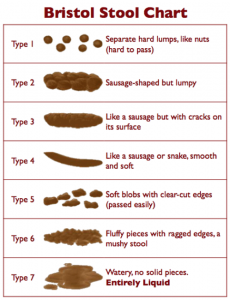We hear (and see!) the phrase ‘gut health’ all the time, but what exactly does it mean? You might be surprised to hear that there’s no official definition of gut health (yes really!), but we can broadly think of gut health as meaning a gut which is free from disease or issues like constipation and bloating. When your gut is healthy, it’s able to do its job properly, digesting and absorbing nutrients effectively, which in turn influences your health as a whole.
A healthy gut also includes a balanced microbiome (the collective name for all the bacteria in your gut). We’re starting to see that some conditions like IBS (irritable bowel syndrome) are associated with reduced numbers of beneficial bacteria, although it’s not yet clear whether this is a cause, or consequence of the condition. We also don’t yet know what the ideal microbiome looks like – but scientists agree that having a microbiome with a diverse range of bacteria is a good thing.
What are the signs of a healthy gut?
Because your microbiome is invisible to the naked eye, the signs of an unhappy gut aren’t always obvious, but your stools (poo) are a helpful indicator. A regular poo habit (between three times a day and three times a week) is considered normal, but you also need to think about the appearance of your poo. I like to refer to the Bristol Stool chart (a cartoon guide to different types of poo!) as it’s a really helpful tool for identifying what’s normal.
 An ideal poo is type 3-4, smooth and easy to pass. Types 1-2 indicate constipation and type 6-7 can be a sign of infection or other gut conditions like IBS (irritable bowel syndrome) or problems like lactose intolerance.
An ideal poo is type 3-4, smooth and easy to pass. Types 1-2 indicate constipation and type 6-7 can be a sign of infection or other gut conditions like IBS (irritable bowel syndrome) or problems like lactose intolerance.
What about other symptoms? Although passing wind is normal (around 15-20 times a day is about average, and is simply a sign of your gut bacteria doing their thing!), excessive or very bad smelling wind can be a sign of malabsorption of certain foods, or underlying gut problems.
The same goes for symptoms like bloating, tummy pain, heartburn and nausea – although suffering from the occasional episode of bloating or heartburn is nothing to be concerned about, ongoing symptoms should be checked out, as they can be a symptom of underlying conditions like acid reflux, IBS or celiac disease.
If you notice a change in your poo or develop gut symptoms that lasts longer than a couple of weeks, it’s really important that you book an appointment with your G.P. to discuss them. They’ll be able to rule out any underlying conditions, and refer you to a specialist if needed. If you feel embarrassed about chatting poo, take a stool and symptom diary along with you, as this can help to explain what’s going on.
How can I take care of my gut health?
We’re still learning how lifestyle affects gut health, but these habits are a great place to start.
- A high fibre diet – Fibre moves waste through your gut and feeds the bacteria in your gut, keeping them fertilised. It’s recommended that we aim for 30 grams a day in the UK – good sources include fruits, vegetables, nuts, seeds, beans, lentils and wholegrains. Word of warning – fibre can be irritating for those with IBS and other gut conditions, so you’ll need to adjust your intake to your personal tolerance.

- Find some feel good movement – We’re not exactly sure why, but exercise seems to increase the number of beneficial bacteria in your gut – it’s also a great way to manage stress. Moderate exercise seems to be the most helpful kind – think walking, cycling, dancing, jogging and swimming.
- Try fermented foods – Foods like kefir, sauerkraut, kimchi and live yoghurt contain helpful bacteria which may contribute to a healthy gut – we’re still learning what effect they have but including some as part of a balanced diet is worth a try.
- Manage the frazzle – Stress is part of life, but it can trigger gut discomfort, and in the long term may actually suppress the growth of beneficial bacteria in your gut. Activities like yoga and meditation are helpful ways of coping – but the important thing is finding something that works for you. So next time you’re taking time out, remember you’re also benefiting your gut bugs!
About Laura Tilt



Leave a Comment: